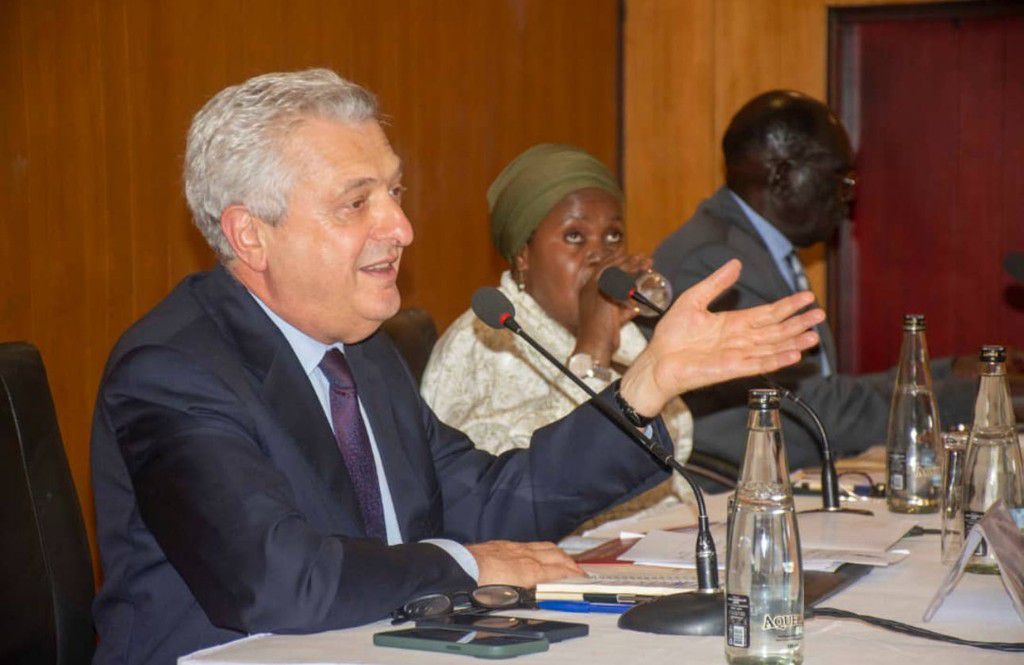Prime Minister calls for sustainable international support for Uganda refugees
)
The Minister made this call in her speech delivered by the 3rd Deputy Prime Minister Hon. Rukia Nakadama, during a meeting with the United Nations High Commissioner for Refugees, Filippo Grandi, at the Serena Hotel in Kampala on 22nd October 2024.
Nabbanja told the UN chief that Uganda is facing a myriad of challenges as it continues to host the largest refugee population in Africa.
With over 1.74 million refugees currently in the country, Uganda has garnered global recognition for its progressive and inclusive refugee policy.
However, as Prime Minister Nabbanja made clear, the strain on Uganda’s resources is becoming increasingly difficult to manage without sustainable, long-term international assistance.
“Uganda has embraced these individuals not only out of compassion but also from our deep-rooted belief in human dignity and the right to live free from fear,” the Prime Minister stated.
Yet according to the Premier, increasing refugee population has placed immense pressure on Uganda’s resources, particularly land.
Uganda’s settlement policy, which provides land for refugees to cultivate and live on, has been a key part of its approach. But with the growing number of refugees, the availability of land is shrinking, leading to significant challenges in maintaining the same level of support.
She also noted that Uganda is facing a protracted refugee crisis, with many refugees remaining in the country for years. As a result, comprehensive strategies are needed to help refugees become self-reliant and economically independent.
“This is a protracted refugee crisis, where individuals settle for years. Therefore, we must develop comprehensive strategies that empower refugees to become self-sustaining,” Nabbanja emphasised.
To support these efforts, Nabbanja called on international donors to provide predictable and flexible funding, primarily in the form of grants, to ensure that Uganda’s refugee response can be sustained over the long term.
Progress on Global Refugee Forum Pledges
Uganda has played a leading role in global discussions on refugee issues, most notably as a co-convener of the Global Refugee Forum (GRF) in December 2023. During the meeting, Nabbanja provided an update on Uganda’s progress in implementing its GRF pledges.
Key achievements include the development of a Self-Reliance Measurement Framework, which will be rolled out across all refugee settlements starting 27th October 2024. This framework, funded by UNHCR, the World Food Programme (WFP), and the AVSI Foundation, will track the progress of refugees in achieving self-reliance.
Uganda has also made strides in addressing environmental and energy challenges in refugee-hosting areas. The Prime Minister highlighted the initiation of a solar-electric cooking partnership for displaced populations, alongside efforts to promote climate-smart agriculture. These initiatives aim to reduce the environmental impact of refugee settlements while providing refugees with sustainable energy solutions.
Addressing the Challenge of Voluntary Returns
While Uganda remains committed to hosting refugees, Nabbanja also emphasised the importance of finding durable solutions, particularly in supporting voluntary returns to refugees’ home countries. However, the Prime Minister acknowledged that the situation in some neighbouring countries, such as the Democratic Republic of Congo (DRC), remains too unstable to support large-scale returns.
“We need to enhance our efforts towards advancing voluntary and dignified returns for refugees, but we cannot do it alone,” Nabbanja stated.

High Commissioner Filippo Grandi commended Uganda’s refugee policy, noting that while it faces challenges, these are part of a broader global issue.
He expressed his hope that other countries around the world could adopt Uganda’s approach to refugee management. Grandi's visit included a stop at Rwamwanja Refugee Settlement, where he met refugees and observed projects aimed at improving their livelihoods.
Eng. Hilary Onek, Uganda’s Minister for Relief, Disaster Preparedness, and Refugees, also addressed the meeting, reiterating the government’s need for international assistance. Onek stressed the importance of the Development Response to Displacement Impacts Project (DRDIP) and requested the World Bank’s continued support for the program, advocating for at least an 80% grant, 20% loan funding structure for its second phase.
Hon. Ruth Aceng, Uganda’s Minister of Health, spoke on the strain that the refugee population places on the country’s healthcare system. She noted that since 2019, the government has transitioned 25 health facilities within refugee settlements to government management and recruited additional health workers. However, she called for more resources to meet the high demand for healthcare services in refugee-hosting areas.
During the meeting, Ms. Hellen Bihari, Director of the Comprehensive Refugee Response Framework (CRRF) in Uganda, provided an update on the government’s progress in implementing pledges made at the 2023 GRF.
Ms. Bihari also addressed the challenges of tracking partner pledges made at the 2019 GRF, noting limited tracking and stocktaking processes. To improve tracking for 2024, UNHCR and the CRRF Secretariat have prepared a dashboard to monitor pledges and are engaging in bilateral consultations with partners to validate pledges.
)
)
)
)
)
)
)